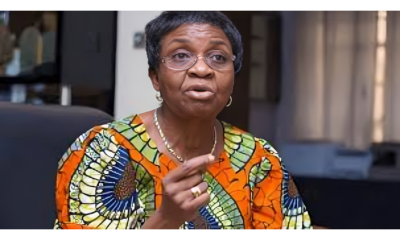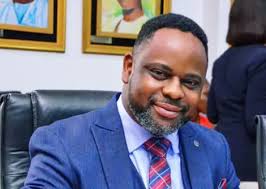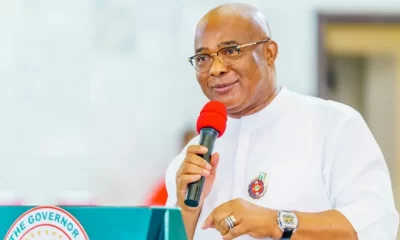Health
WHO Faults COVID-19 Vaccine Distribution Ratio

By Laide Akinboade, Abuja
Director-General of the World Health Organisation (WHO), Dr Tedros Ghebreyesus, has raised alarm over the distribution of vaccines, especially to health workers and the elderly in low-income countries.
He lamented that rich countries are sabotaging equitable access to the vaccine.
He noted that more than 39 million doses of vaccines have been administered in at least 49 higher-income countries, whereas, only 25 doses have been distributed in one lowest-income country.
He said some countries and companies continue to go around the COVAX facility in order to jump to the front of the queue by driving up prices.
These actions, according to him, will lead to hoarding, chaotic market, uncoordinated response, continued social and economic disruption, delay the delivery of vaccines to poor countries and prolong the pandemic.
The WHO boss urged higher-income countries and manufacturers of vaccines to work together in solidarity to ensure that within the first 100 days of this year, vaccination of health workers and older people is underway in all countries.
Speaking during its 148th session of the Executive Board, Ghebreyesus, stated: “The recent emergence of rapidly-spreading variants makes the rapid and equitable rollout of vaccines all the more important.
But we now face the real danger that even as vaccines bring hope to some, they become another brick in the wall of inequality between the world’s haves and have-nots.
“It’s right that all governments want to prioritize vaccinating their own health workers and older people first.
But it’s not right that younger, healthier adults in rich countries are vaccinated before health workers and older people in poorer countries.
There will be enough vaccine for everyone. But right now, we must work together as one global family to prioritise those most at risk of severe diseases and death, in all countries.
“For the past nine months, the ACT Accelerator and the COVAX vaccines pillar have been laying the groundwork for the equitable distribution and deployment of vaccines.
We have secured two billion doses from five producers, with options on more than one billion more doses, and we aim to start deliveries in February. I use this opportunity to thank Gavi and CEPI.
“COVAX is ready to deliver what it was created for. But, in recent weeks, I have heard from several member States who have questioned whether COVAX will get the vaccines they need, and whether high-income countries will keep the promises they have made.
As the first vaccines begin to be deployed, the promise of equitable access is at serious risk.
“More than 39 million doses of vaccine have now been administered in at least 49 higher-income countries. Just 25 doses have been given in one lowest-income country. Not 25 million; not 25 thousand; just 25.
“I need to be blunt: the world is on the brink of a catastrophic moral failure – and the price of this failure will be paid with lives and livelihoods in the world’s poorest countries.”
“Even as they speak the language of equitable access, some countries and companies continue to prioritize bilateral deals, going around COVAX, driving up prices and attempting to jump to the front of the queue.
This is wrong. 44 bilateral deals were signed last year, and at least 12 have already been signed this year.
The situation is compounded by the fact that most manufacturers have prioritized regulatory approval in rich countries where the profits are highest, rather than submitting full dossiers to WHO.
“This could delay COVAX deliveries and create exactly the scenario COVAX was designed to avoid, with hoarding, a chaotic market, an uncoordinated response, and continued social and economic disruption.
Not only does this me-first approach leave the world’s poorest and most vulnerable people at risk, it’s also self-defeating.
“Ultimately, these actions will only prolong the pandemic, the restrictions needed to contain it, and human and economic suffering. Vaccine equity is not just a moral imperative, it is a strategic and economic imperative.”
Health
We want Nigeria Where No Child Is Exploited, Excluded – Children’s Parliament

National Children’s Parliament has urged stakeholders to build a Nigeria where no child faces violence, forced labour or exclusion.
The Speaker of the parliament, Progress Umoh, made the call at the 2025 National Children’s Day in Abuja on Tuesday.
Umoh said that children craved for a country where every child has the tool to learn, dream and grow to full potential.
She pointed out that many children face violence, fear and exclusion in spaces meant to nurture them, adding that children demand more than promises.
“We demand protection. As Nelson Mandela said — a society’s soul is measured by how it treats its children.
“Let us honour that truth with action.
“As the speaker of the National Children’s Parliament, I stand before you not just as a young Nigerian but as a voice for millions of children whose rights and future depend on meaningful action.”
She said that the Children’s Parliament serves as vital platform where young voices unite to address critical issues, propose solutions and drive change.
According to her, children deserve a seat at the table in shaping policies that affect them.
She noted that the theme of the global observance — “Stand Up, Speak Up: Building a Bullying-Free Generation”, is an urgent call to action.
She, therefore, called for full implementation of the National Policy on Safe Schools to ensure every child learns in a safe environment without fear.
The speaker also stressed the need to strengthen child rights advocacy clubs in rural and underserved areas.
This, according to her, will empower young leaders to speak up.
She explained that “while initiatives like the National Commission for Almajiri Education are commendable, we need bolder steps to rescue out-of-school children, providing them education, safety and skills for the future.
“Programmes like the Girl-Led Movement proves that when children lead, change happens, such
initiatives must include all children, ensuring their voices shape decisions about their lives.”
Responding, President Bola Tinubu reaffirmed his administration’s commitment to protecting the rights, dreams and future of every Nigerian child.
Represented by the Minister of the Federal Capital Territory, Mr Nyesom Wike, the president described children as “the precious part of the nation’s fabric.”
Wike was also represented at the event by the FCT Minister of State, Dr Mariya Mahmoud.
Tinubu added that children are also the heartbeat of Nigeria’s future and custodians of tomorrow’s promise, innovation and leadership.
He said “I, therefore, reaffirm today, our constitutional, moral and intergenerational duty and commitment to safeguard every Nigerian child, protect their rights and nurture their dreams.”
Similarly, the Minister of Women Affairs, Imaan Sulaiman-Ibrahim, said children’s day serves as an opportunity to reaffirm commitment to uphold the rights of every child to survive, thrive and fulfil their potential.
Sulaiman-Ibrahim added that the day also presents an opportunity to reflect and renew commitment to the rights, protection and wellbeing of every Nigerian child.
She said the Federal Government would strengthen the Nigeria Children’s Parliament to institutionalise child participation in governance.
“We are also developing the institutional framework for a National Child Protection and Development Agency.
“This strategic action aligned with the ministry’s Five-Year Strategic Roadmap to ensure accountability, coordination and sustainability in child welfare programming.”
On her part, Dr Adedayo Benjamins-Laniyi, the Pioneer Mandate Secretary, FCT Women Affairs, said “we are here to recognise the significance of our children in the family circle and the society at large.
“Importantly, we are here to stress the obvious fact that our children are great asset to us, they represent our hope, our continuity, our vision and most importantly, the future of our dear country, Nigeria.
“Today, as we gather to celebrate our children, we call on our teeming students in FCT to rise against bullying and speak up whenever confronted with this radical menace.
“I urge you to avoid bullying and channel all your energy to academic resourcefulness to shape a better tomorrow for yourselves,”(NAN)
Health
Menstrual Health Day: AHF Nigeria Wants Joint Action to End Period Poverty

The AIDS Healthcare Foundation (AHF) Nigeria, has called for joint actions to ending period poverty in Nigeria with consistent investment in initiatives that bridged the knowledge gap of menstrual health management.
The AHF Nigeria Country Programme Director, Dr. Echey Ijezie, made the call on Monday in a statement in Lokoja.
The Menstrual Health Day is observed annually on May 28.
The 2025 Menstrual Health Day has as its theme ”Let’s Fight Period Poverty and End the Stigma”.
Ijezie said that research showed that nearly 2 billion people menstruate globally, with 500 million experiencing period poverty, including the lack of access to menstrual health products, safe and clean facilities, and accepting communities.
“We are calling on government to invest in providing free sanitary pads to young girls, across Nigeria, especially indigent girls who lack access to sanitary pads,” he said.
He emphasised the need for collective actions to address the stigma, cultural taboos, and lack of menstrual hygiene access that undermine dignity and increase HIV risk among women and girls.
He said that as part of activities to commemorate the World Menstrual Health Day 2025, the AHF Nigeria would carry out a commemorative event at WAPI Secondary School Calabar, Cross River as well as in the Karinmajigi community in Abuja.
The country pragramme director noted that women and girls globally, particularly in regions like sub-Saharan Africa, were faced with a disproportionate HIV burden.
He stressed that lack of access to sanitary pads had forced many to miss school, thereby increasing the likelihood of dropping out.
This, he said often resulted to increased transactional or transgenerational sex, limiting their ability to negotiate safer sex thereby raising the risk of contracting HIV.
He explained that the AHF’s menstrual health day worldwide commemorations were part of broader strategic prevention efforts that highlight the link between menstrual health and HIV.
He added that it would promote the availability and accessibility of menstrual products, and integrate sexual and reproductive health information and services.
According to him, it will ensure that women, girls, and people who menstruate have access to sanitary pads, HIV testing, condoms, and essential care.
He disclosed that the AHF Nigeria would empower young women and girls, both in-school and out-of-school with the information and knowledge they require for a safe menstrual experience.
“Importantly, we shall provide free sanitary pads, both disposable and reusable to young girls in Calabar, Abuja and Makurdi.
“AHF is committed to ending period poverty in Nigeria with consistent investment in initiatives that bridges the knowledge gap of menstrual health management.
“We will bridge the knowledge gap in young women and girls and in combating the myths, stigma and cultural taboos undermining the wellbeing of young women and girls.
“To this end, we will continue to expand access to accurate information and the provision of free sanitary pads to compliment the efforts of other concerned stakeholders,” Ijezie said.
He noted that barriers, along with stigma, could lead to poor health outcomes, missing school or work, and adverse effects on mental health.
NAN reports that AHF, the largest global AIDS organisation, currently provides medical care and services to more than 2.2 million people in 48 countries worldwide. (NAN)
Health
Children’s Day: Prioritize Girl-Child’s Needs — NGO

A non-governmental organisation — Mothers And Marginalized Advocacy Centre (MAMA) — has urged governments, civil society groups, and the public to unite in prioritizing the needs of children, especially the girl-child.
The Executive Director of the organisation, Ms Chioma Kanu, made the call in a statement on Sunday ahead of the International Children’s Day on May 27.
Kanu said that a country, such as Nigeria, where every girl could grow up safe, educated, and free from exploitation could be achievable through collective action.
She said that the organisation was founded and led by survivors of domestic violence, including women and girls.
She said, therefore, the survivors were raising a powerful voice to highlight the critical and often overlooked needs of girls and vulnerable groups across Nigeria.
“Drawing upon lived experiences, we urge increased awareness, targeted interventions, and stronger protective measures to safeguard this vulnerable population, ” Kanu said.
According to her, Nigeria continues to grapple with complex socio-economic challenges that disproportionately impact girls and women.
This, she said, left them at heightened risk of exploitation, violence, and trafficking.
“As survivors, we understand the insidious ways in which vulnerability can be exploited.
“International Children’s Day should be a time of celebration and hope, but for countless girls in Nigeria, it is a reminder of the dangers they face daily.
“We cannot stand idly by while their futures are stolen, “ Kanu said.
The founder also called for attention to several key areas requiring urgent action such as education and empowerment programmes.
Kanu said: “We believe that ensuring access to quality education for all girls is paramount in preventing exploitation.
“Empowering women through skills development and economic opportunities reduces their vulnerability to traffickers and abusive situations.
“We advocate for increased investment in girls’ education, scholarships for marginalised communities, and programmes that promote financial independence for women.”
The founder also called for an end to Gender-Based Violence in Nigeria.
According to her, the prevalence of gender-based violence, including sexual assault and harmful traditional practices, creates a climate of fear and insecurity that traffickers exploit.
“MAMA Centre therefore calls for the strict enforcement of laws protecting women and girls, the provision of comprehensive support services for survivors of violence, and community-based initiatives that challenge harmful norms,” she said.(NAN)






























